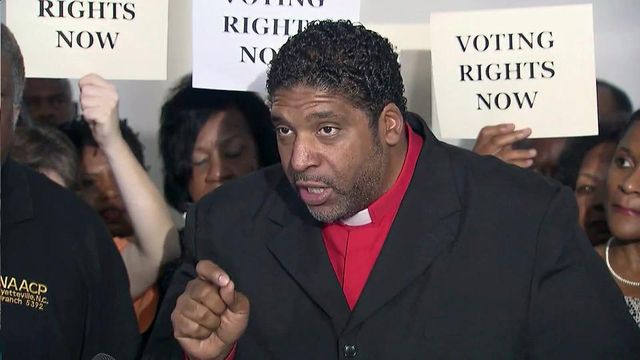Ruling: No same-day registration in NC election
Same-day registration won't be allowed during early voting in North Carolina and Election Day ballots cast in the wrong precinct won't be counted this fall after the U.S. Supreme Court on Wednesday blocked a ruling that had set aside parts of a 2013 election law.
Posted — UpdatedA majority on the nation's highest court agreed to halt the ruling of the 4th U.S. Circuit Court of Appeals. Two justices dissented.
The decision means the full law will remain enforced while the state and civil rights groups that challenged the law prepare for trial next summer. The full law was enforced during the May primary as well.
Early voting begins Oct. 23 and the registration deadline remains Friday, as originally planned.
The court's order was unsigned, as it typically is in these situations. Justices Ruth Bader Ginsburg and Sonia Sotomayor dissented, saying they would have left the appellate ruling in place. It is unclear how the other seven justices came down on the matter, other than that at least five formed a majority and voted in North Carolina's favor.
State attorneys filed an emergency application for a stay last week, the day after the 2-1 circuit court decision in favor of setting aside the provisions. Lawyers for the state argued that bringing back the provisions would cause voter confusion and trouble for local election officials to implement them again.
Lawyers for civil rights groups and voters who sued downplayed the problems and said keeping the law fully in place would mean thousands of voters would be disenfranchised. They said black voters use same-day registration and out-of-precinct balloting at higher rates than whites.
"Thousands of North Carolinians will be left out of the upcoming election," Dale Ho, director of the ACLU's Voting Rights Project, said in a statement. "More than 20,000 North Carolina voters used same-day registration in the last mid-term election. While this order is not a final ruling on the merits, it does allow a law that undermines voter participation to be in effect as this case makes its way through the courts."
State NAACP President Rev. William Barber held a news conference Thursday and said the Supreme Court's decision will keep some North Carolina voters from casting a ballot on Election day.
"They tried to focus this on voter ID, but that’s not what this is about," Barber said. "This has everything to do with voter suppression."
Ginsburg wrote she would have denied the application, saying the lower appeals court agreed at least two provisions in the law "risked significantly reducing opportunities for black voters to exercise the franchise in violation" of a portion of the U.S. Voting Rights Act.
"I would not displace that record-based reasoned judgment," she wrote. The majority provided no explanation of its ruling, which also stays a preliminary injunction filed by a federal trial court judge in Winston-Salem.
The decision is a victory for the state and Republican leaders at the General Assembly who passed the law. GOP Gov. Pat McCrory signed the bill into law. Three lawsuits challenging several provisions have been filed by the North Carolina state NAACP, League of Women Voters and the U.S. government among others.
"The court’s ruling restores the clarity and certainty to the election process that has been in place since the May primary and was disrupted at the eleventh hour. These commonsense reforms will help support voter integrity in North Carolina while protecting every citizen’s constitutional right to vote," House Speaker Thom Tillis and Senate President Pro Tem Phil Berger said in a statement.
"We respect the legal process and thank the Supreme Court justices for protecting the integrity of our elections," McCrory said in a statement.
Other voting law changes passed last year already were to stay in place for the Nov. 4 ballot. They include reducing early voting to 10 days and preparing voters for a photo identification requirement in 2016.
Copyright 2024 by WRAL.com and the Associated Press. All rights reserved. This material may not be published, broadcast, rewritten or redistributed.






